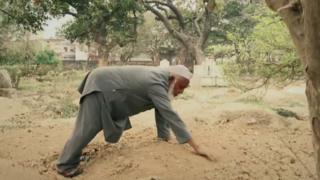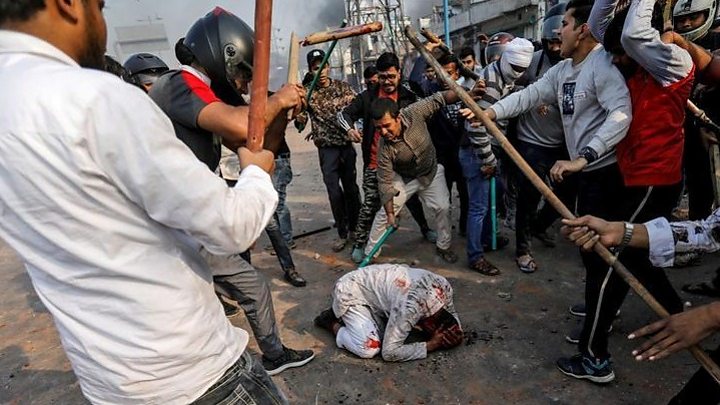 Itemizing copyright
Itemizing copyright
Mohd Shabbir
Mohammad Shareef started burying our our bodies after his son’s loss of life
Mohammad Shareef by no means purchased to bury his son. As a exchange, he has spent the ultimate 27 years burying the unclaimed little children of a whole bunch of various households.
It took a month for police to relate Mr Shareef that his son had died, and even then, they’d presumably not narrate him the assign, or how.
All Mr Shareef is aware of is that his son, Mohammad Rais, was one among practically 2,000 of us killed throughout the Hindu-Muslim riots which engulfed India following the destruction of a mosque on a disputed spiritual area in 1992.
Mr Shareef would not even know the assign the 25-yr-broken-down was buried.
“Police urged me his physique had decomposed,” Mr Shareef recalled, practically three many years on. “We did not witness his physique. We superb purchased his garments.”
Nonetheless a few months later, he would ogle one thing which might swap his life with out finish.
“Ultimately I noticed regulation enforcement officers throwing a physique right into a river. I used to be insecure,” Mr Shareef says.
Along with the phobia, received proper right here a realisation.
“I mediate my son’s physique may presumably want been thrown right into a river, impartial take pleasure in various such uninteresting our our bodies. That day I stated to myself, from in the meanwhile time I am the guardian of deserted uninteresting our our bodies and I’m going to provide them a upright funeral.”
Itemizing copyright
Mohd Shabbir
Mr Shareef says his confederate Bibi by no means recovered from the loss of life of their son
Unclaimed our our bodies pile up in India for a bunch of causes: they’re going to very neatly be of us that misplaced their lives in aspect freeway and rail accidents, or of us that died a great distance from dwelling – pilgrims, migrants, broken-down of us deserted by their children.
Some impoverished victims die in sanatorium with out a-one to deal with up the funeral.
Nonetheless what to cease with the our our bodies? Discount in 1992, many districts in India did not bear a mortuary facility. It was fairly frequent educate to eliminate unclaimed our our bodies shortly.
Burial was essentially the most neatly-liked method, however in some areas in north India they dumped unclaimed human stays into rivers to maintain cash, time and vitality.
Extra reviews from India
Mr Shareef’s household bear lengthy suspected that Rais’ physique ended up throughout the Gomti river. It flows earlier Sultanpur, the metropolis the assign the youthful man had been working as a chemist in December 1992 – the month when Hindu fundamentalists tore down the 16th Century Babri mosque in Ayodhya, Mr Shareef’s dwelling, 65km (40 miles) away.
Rais went lacking amid the bloodshed which adopted.
“After my son disappeared I hunted for him in every and every single area for a month, take pleasure in a mad man,” his father says. “I did not protected him anyplace. I even went to Sultanpur to have a study him.”
Then received proper right here the guidelines they’d been dreading: their liked son was uninteresting. Mr Sharif and his confederate Bibi have been traumatised. His confederate tranquil struggles with intervals of despair to on in the meanwhile time and age.
The problem is aggravated by the reality they have been not prepared to provide their son a upright burial. It is miles a trouble nobody else may presumably impartial tranquil struggle by the use of, Mr Shareef says.
“I decided that in my district, I may presumably presumably not let any unidentified physique be thrown away right into a river,” he says.
Itemizing copyright
Mohd Shabir
Shareef says he takes care of the unknown uninteresting individuals as he would a member of the family
In India’s caste-sure Hindu society, of us who have been on the underside have been traditionally pressured to cease the job of burial and cremations – after which dealt with as “untouchables” which capability.
Nonetheless Mr Shareef – a bicycle mechanic by alternate – was now to not be deterred. He urged the police about his need to take in a job shunned by all people else.
“Once I bought the primary name, my coronary heart was pounding. After the autopsy, the police requested me to bewitch away the physique. I clearly contemplate that particular person’s neck was slashed.”
Rapidly, his workload started to elongate. He even supplied a four-wheeled cart to rush the uninteresting.
Predictably his household, associates and neighbours have been vastly greatly surprised. Concurrently a Muslim, Mr Sharif started to expertise the equal social exclusion as his Hindu colleagues.
“No-one in my household was completely satisfied at that time. They stated, ‘you bear received lengthy earlier mad’.
“Some of us have been insecure of me. They thought they’d protected contaminated with germs throughout the occasion that they made bodily contact with me.”
However Mr Shareef was decided in his conviction. He had skipped household weddings, gala’s and even prayers for the sake of unknown of us. It gave him peace and solace: performing closing rights is a 2nd to think about his son.
“It helped me to dwelling the issue of my son’s loss of life. I bear in mind him your complete time. I omit him.”
Itemizing copyright
Getty Photographs
Within the Hindu caste diagram, of us who’re relegated to the underside of the pyramid are pressured to help with cremations and burials
It is not a simple job. Police on the overall struggle to determine the physique, that map they’re going to impartial had been uninteresting for some time. Typically it’s not the our our bodies, Mr Shareef says, however the odor which is most off-placing.
“Each time I witness a badly mutilated or decomposed physique it’s refined to sleep. I surely bear nightmares and resort to napping capsules,” he explains.
“Most ceaselessly police officers include me to the cemetery however even they stand a great distance away.”
The whole equal, he repeatedly takes the time to variety positive the particular person is given the upright remedy, on the overall bathing the physique.
If he realises the uninteresting particular person is Muslim, he wraps the physique in a sheet of fabric and recites the ultimate prayers. If the physique belongs to a Hindu, he takes it to be cremated.
No-one know exactly what number of our our bodies Mr Shareef has buried. The pinnacle of Ayodhya district administration, Anuj Kumar Jha, urged the BBC that they make not bear fleshy information of the our our bodies handed over to Mr Shareef.
“Our robust estimate is we might bear given about 2,500 our our bodies to him,” he stated. Mr Shareef’s household snort he has given closing rites to additional than 5,500 of us.
However for years, he toiled with none financial improve. To on in the meanwhile time and age, he works in his bicycle retailer, incomes the equal of about $three a day.
Itemizing copyright
Shabir
Mr Shareef continues to hurry his roadside cycle restore retailer to provide for himself and his confederate
Nonetheless points are altering. He has been recognised for his dedication. The authorities has given him one among India’s high civilian awards, whereas native retailer house owners now additionally help cover his payments. On the age of 80, he’s now able to bear two paid assistants who’re sharing his burden.
“Every and every Hindus and Muslims help me. People give me meals and heat blankets. Presently I wanted to bear an search for operation – a stranger known as me and gave me 20,000 rupees [$290].”
Nonetheless retirement is not one thing he’s tantalizing to bewitch into consideration. Neither his two surviving sons nor grandchildren deserve to teach in his footsteps, and he’s acutely attentive to what is going on to occur if he stops doing this work.
“If I am not there, police will throw the our our bodies into rivers as they did earlier than.”
For a one who some name the “saviour of the uninteresting” that may presumably presumably be insufferable.
“I’m going to proceed doing this until my closing breath,” he says.
You may presumably presumably furthermore be drawn to:

Media playback is unsupported on your instrument

No comments:
Post a Comment